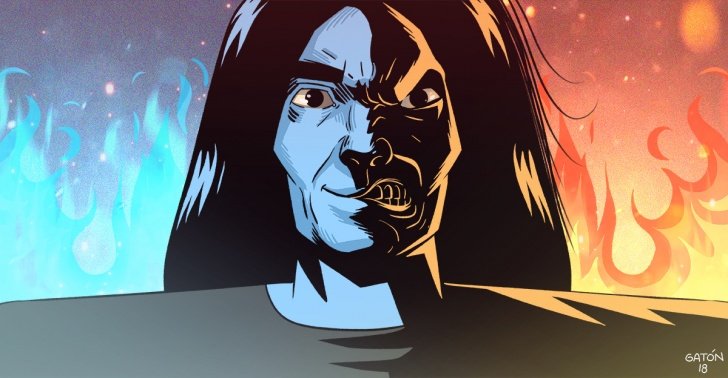
Image from César Mejías
"If there is a problem of bad parenting on the part of the parents, it simply blames the damn rock n 'roll. It is the easiest exit. It's ridiculous. It went out of hand. It was outrageously stupid. 'Stop those children of Satan!' You can not correct stupidity, you just can not. It's stupid, it's blind, it's blind stupidity, "said Brian Johnson, vocalist of AC / DC.
These statements by him were given when they were linked to the case of serial killer Richard Ramírez, an American of Mexican origin, known as The Night Stalker.
Ramirez terrorized the state of California with a series of brutal murders. Inspired by Satanist beliefs, Ramírez always attacked at night and used to draw inverted pentagrams in the scenes of his crimes, as a signature.
On March 17, 1985, Ramírez left behind in the house of one of his victims the piece that would stigmatize AC / DC forever: a hat with the logo of the band.
He was finally captured in August 1985 and spent more than 20 years in prison, until he died in prison in 2013 due to natural causes when he was awaiting execution in the gas chamber.
Another case was that made by members of the Manson clan when they stormed the home of filmmaker Roman Polanski in Los Angeles, California, and murdered his wife, Sharon Tate (who was eight months pregnant) and four others. In the scene of the horrendous crime, the assassins wrote with blood words like "Death to pigs", "Rise" and "Helter Skelter", which make reference to songs of The Beatles.
During the trial, Manson claimed to have heard "secret messages" on The Beatles' White Album, whose interpretation led him to plan the murders at the Manson-Tate family home. That is, perhaps, the most popular case of a violent act allegedly induced by a song or by the lyrics of it.
What does science say about it?
Since the media explosion of cases like those of AC / DC and Judas Priest, in addition to others like the trial against Ozzy Osbourne for the suicide of John McCollum in 1984 (supposedly inspired by the song Suicide Solution) and the alleged connection of the shooting of Dawson College (2006) with the song À Tout Le Monde by Megadeth, social psychology has tried to test the influence that musical genres such as rock and metal have on our behavior.
In 1999, a study conducted by the Department of Educational Psychology at the University of Oklahoma analyzed the musical tastes of 121 students and crossed them with two other tests: the Inventory of Reasons to Live ("RFL") and the Suicide Risk Questionnaire ("SRQ").
The results showed that heavy metal fans had a lower moral objection to suicide and a low score on the items of responsibility with their family and spirit of improvement. However, the authors comment, this does not necessarily mean that listening to metal is a risk factor for suicide. In fact, the results suggest that heavy metal attracts already troubled young people, instead of "creating them".
Another study, published by the Journal of Personality and Social Psychology in 2003, measured the feeling of hostility of young volunteers after listening to two similar songs: one with violent content in its lyrics and another without. In a series of several experiments, the subjects studied showed a higher level of hostility after listening to the songs with violent content. Sensations such as anger and the desire to scream were some of the immediate effects that music provoked in individuals.
While this feeling of hostility faded minutes after the song ended, the authors explained that constant exposure to violence, through television, music and video games, can contribute to the development of a violent personality.
Finally, a study conducted by psychology academics from the universities of Humboldt, Texas, California and Ohio, interviewed adults who grew up listening to heavy metal in the '80s about their childhoods and their current vision of life. After comparing their responses with those of other non-metal adults, it was concluded that those who grew up listening to Iron Maiden, Judas Priest and Metallica, among other bands, reported a higher level of family problems and risk behaviors in their youth, but today they are happier and live with less regrets than non-metal adults. According to the study, they are people who grew up with a sense of belonging, thanks to the support of being part of a "metal community".
Now, what do you think?
Information collected from:
For more information visit those websites 👆
This follows along the lines of video game violence. as a lifelong listener to rock and metal, and an avid violent video game player I have never once had the urge to murder someone in cold blood. its a disturbed or trouble mind that leads to violent acts and behavior